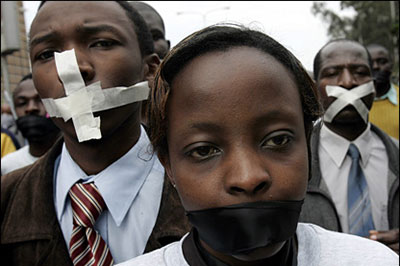Few in Kenya’s media could comprehend how a media bill, considered the most repressive in Kenya’s 50-year history, could sail so easily through Parliament last week. Fittingly, Parliament passed the Kenya Information and Communications Amendment Bill on Halloween. It is awaiting President Uhuru Kenyatta’s signature following a 14- day deliberation period.
The bill, compared in local editorials with South Africa’s oppressive, apartheid-era press laws, allows the government total control over a media ombudsman and sets exorbitant fines designed to silence offending journalists and entire media houses alike. If induced self-censorship is not enough, the stringent programming and advertising requirements the bill imposes would ensure the closure of Kenya’s media outlets. “No media house, not even K24, which is owned by the president, could survive under this bill’s requirements,” the deputy chairman of Kenya’s Editors’ Guild, David Ohito, told me.
The bill creates a government-appointed Communications and Multimedia Appeals Tribunal, which will take over the work of the former Complaints Commission of the independent Media Council. There is no requirement that the tribunal include any journalist, according to news reports. The proposed tribunal came as a shock to local media players, since it was not in the gazetted version of the bill but was introduced on the floor of the House last week during its third reading, local journalists said.
Under the bill, an anonymous complaint may be lodged whereby a journalist found to be wayward could be fined a staggering 1 million Kenyan shillings (US$2,000) and a media house 20 million Kenyan shillings (US$35,000). Even worse, authorities can withdraw a journalists’ accreditation and seize any property or other assets to cover the fine. According to the Daily Nation’s legal expert, Sekou Owino, with the exception of drug offences, there is no other law that empowers an authority to levy so great a fine. “Given that Kenyan media houses make on average 1.2 million Kenyan shillings per year, all would go under [with this bill],” Ohito added.
If a journalist wrote a critical story against an official, that same official could file an anonymous complaint to an impartial government tribunal who could then blacklist and fine the journalist into silence. “As a journalist, the greatest discouragement of covering a story is the financial implications,” Nationreporter Aggrey Mutambo told me. If the bill was active, stories Aggrey wrote last year involving graft at the Education Ministry and at Kenya’s embassy in Japan would have never seen the light of day, he says. Kisumu-based Star and Kiss FM correspondent Sammy Otieno believes a mass exodus from the profession would occur if the bill passes in its current form. “No one will ever attempt investigative journalism under this bill. It is indirectly telling people not to join the profession,” he told me.
The Kenya Information and Communications Bill also requires 60 percent local content from the media and 45 percent local advertisement revenues. While no one objects to the concept of encouraging more Kenyan-made programming, the requirements are unsustainable. “Local content is more costly to produce,” said Henry Maina, East Africa director of the press freedom organization Article 19. The popular broadcaster Citizen, for instance, leads the way with 18 percent local content, Maina added. “Somehow [under this law] Citizen would be expected to triple this in 21 days. Not even the public broadcaster KBC (Kenya Broadcasting Corporation) could survive.”
Many local journalists I spoke to believe the parliamentarians, who passed the bill in 30 minutes with a minimum in attendance, simply had not properly thought through the bill’s implications. Fortunately, President Kenyatta and Information Cabinet Secretary Francis Matiang’i have assured the press more review will take place before it is signed into law. But the space for free expression is still shrinking. According to news reports, Parliament, using sweeping terminology, is set to amend another media bill, the Media Council Bill, to allow the government absolute powers to ban media houses for anything “prejudicial to public interest or national interest,” amongst other terms. Another piece of legislation, the Miscellaneous Amendment Bill 2013, which came hot on the heels of the Information Bill, would severely cut access to foreign funding for non-profit organizations, according to news reports. The bill resembles that passed in Ethiopia in February 2009, the Charities and Societies Proclamation, which effectively curtailed all civil society activities, Maina said.
Opinions are divided as to whether the Kenyan press will be able to counter such legislative threats. The press vocally protested the Kenya Information and Communications Bill and twitter hashtags, such as #MediaGag, echoed citizen’s objections. But others believe the press has abdicated its watchdog role, allowing such repressive legislation to emerge. “It was long coming,” one tweet read after the bill was passed, “The media went to bed with the government and the pregnancy is out.”
Even if the media and civil society manage to lobby successfully against passage of this retrogressive legislation, its swift parliamentary passage leaves a clear warning. In neighboring Tanzania, 17 anti-press laws remain on the books, according to CPJ research, although they are rarely used. “They don’t have to be,” said Theophil Makunga, group managing editor of Tanzania’s leading daily Mwananchi. “Just the fact they are on the books scares the press into silence.” Similarly, repressive bills such as the Kenya Information and Communications Amendment Bill send a chilling message to reporters and the public alike: criticize us and we’ll unleash this one on you. If the Kenyan press is to survive such threats, a unified, politically impartial press corps will need to be in place as witnessed during the press’ protests in 2007 against an amendment to the 2005 Media Act that would have compelled editors to reveal their sources.
